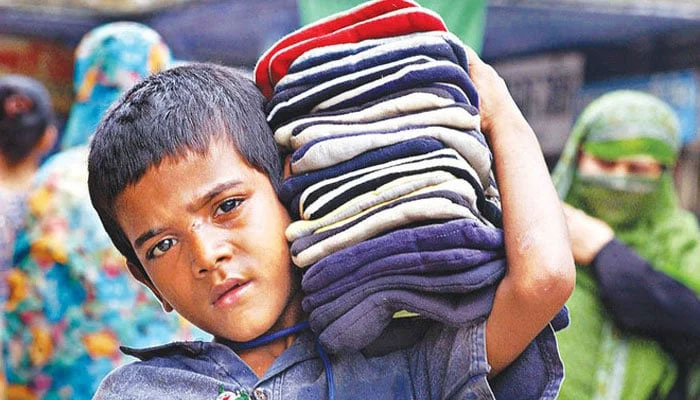End child labour
According to Unicef, in Pakistan, at least 3.3 million children are employed in child labour
People in Pakistan are blissfully unaware of the plight of millions of children from poor and underprivileged backgrounds who are left on their own to fend for themselves. Had this not been the case, people should by now have taken to the streets, demanding leaders to do something to push the country’s children out of the vicious cycle of poverty and backbreaking labour. On June 12, the world observes World Day Against Child Labour – and yet continues to betray the children who are reliant on protection, love, and empathy. According to Unicef, in Pakistan, at least 3.3 million children are employed in child labour. This number is likely to be significantly lower than the actual figures. Many households employ children as domestic workers in clear violation of the law and keep them under miserable conditions. Every now and then, a bloodcurdling incident of a child being beaten to death by his/her employers surfaces on TV. The problem is not limited to Pakistan or the Subcontinent, but is also rampant in sweatshops in South-east and Far East Asia where countries produce tonnes of fast-fashion clothes to allow Instagram-addicted people in the developed world to make their new posts. It is also widespread in the minefields of Congo where children put their lives in danger to extract minerals required for new smartphone models and environmentally friendly electric vehicles.
Children born in the developed world of the US are also not blessed enough. A 2023 ‘The NewYorker’ article says that child labour in America is on the rise. “The number of minors employed in violation of child-labour laws last year was up 37 per cent from the previous year, according to the Department of Labor, and up 283 per cent from 2015.” That we have failed our children is an understatement; we have crushed their spirits and deliberately kept them away from a world of learning and opportunities. As put by American biologist Stephen Jay Gould: “I am, somehow, less interested in the weight and convolutions of Einstein’s brain than in the near certainty that people of equal talent have lived and died in cotton fields and sweatshops.”
The class divide has become more prominent now with well-off people snickering at poor parents with big families. Vloggers who go to a developing country for cheap vacations are often seen asking poor vendors ‘not to birth more children’ if they have no money. No one stops and thinks how they can contribute towards ensuring that no child is left behind. For Pakistan, there is still time. If authorities use technology the right way, they can educate their children and give them an option to leave the life of bonded labour behind. The edtech market is growing, and Pakistanis have shown interest in downloading apps based on learning. It is on authorities to tap into this potential and provide children with the education they need to move ahead in lives. Those who employ children should also be dealt with strictly so that the future of children is protected. It is not too late yet; it is now on the government to take the first step.
-
 Lana Del Rey Announces New Single Co-written With Husband Jeremy Dufrene
Lana Del Rey Announces New Single Co-written With Husband Jeremy Dufrene -
 Ukraine-Russia Talks Heat Up As Zelenskyy Warns Of US Pressure Before Elections
Ukraine-Russia Talks Heat Up As Zelenskyy Warns Of US Pressure Before Elections -
 Lil Nas X Spotted Buying Used Refrigerator After Backlash Over Nude Public Meltdown
Lil Nas X Spotted Buying Used Refrigerator After Backlash Over Nude Public Meltdown -
 Caleb McLaughlin Shares His Resume For This Major Role
Caleb McLaughlin Shares His Resume For This Major Role -
 King Charles Carries With ‘dignity’ As Andrew Lets Down
King Charles Carries With ‘dignity’ As Andrew Lets Down -
 Brooklyn Beckham Covers Up More Tattoos Linked To His Family Amid Rift
Brooklyn Beckham Covers Up More Tattoos Linked To His Family Amid Rift -
 Shamed Andrew Agreed To ‘go Quietly’ If King Protects Daughters
Shamed Andrew Agreed To ‘go Quietly’ If King Protects Daughters -
 Candace Cameron Bure Says She’s Supporting Lori Loughlin After Separation From Mossimo Giannulli
Candace Cameron Bure Says She’s Supporting Lori Loughlin After Separation From Mossimo Giannulli -
 Princess Beatrice, Eugenie Are ‘not Innocent’ In Epstein Drama
Princess Beatrice, Eugenie Are ‘not Innocent’ In Epstein Drama -
 Reese Witherspoon Goes 'boss' Mode On 'Legally Blonde' Prequel
Reese Witherspoon Goes 'boss' Mode On 'Legally Blonde' Prequel -
 Chris Hemsworth And Elsa Pataky Open Up About Raising Their Three Children In Australia
Chris Hemsworth And Elsa Pataky Open Up About Raising Their Three Children In Australia -
 Record Set Straight On King Charles’ Reason For Financially Supporting Andrew And Not Harry
Record Set Straight On King Charles’ Reason For Financially Supporting Andrew And Not Harry -
 Michael Douglas Breaks Silence On Jack Nicholson's Constant Teasing
Michael Douglas Breaks Silence On Jack Nicholson's Constant Teasing -
 How Prince Edward Was ‘bullied’ By Brother Andrew Mountbatten Windsor
How Prince Edward Was ‘bullied’ By Brother Andrew Mountbatten Windsor -
 'Kryptonite' Singer Brad Arnold Loses Battle With Cancer
'Kryptonite' Singer Brad Arnold Loses Battle With Cancer -
 Gabourey Sidibe Gets Candid About Balancing Motherhood And Career
Gabourey Sidibe Gets Candid About Balancing Motherhood And Career




